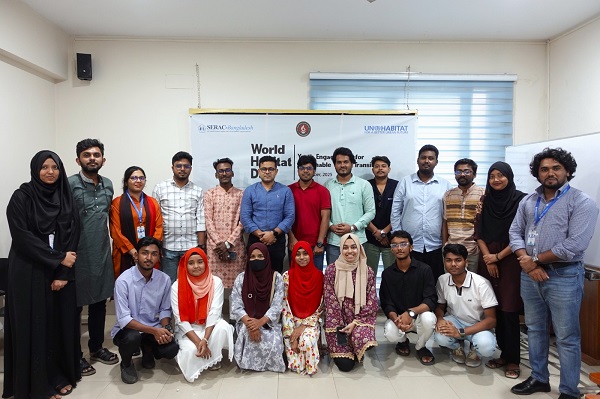
Today, on 6 October 2025, SERAC-Bangladesh observed a special event in Dhaka to mark World Habitat Day. The program was themed “Youth Engagement for Sustainable Urban Transition” in collaboration with UN-Habitat and Bangladesh Urban Youth Council Network through the SHIFT Project.
World Habitat Day highlights the importance of adequate shelter and sustainable urbanization. A habitat is not just housing but it encompasses the broader living environment, including neighborhoods, public spaces, and community facilities that enable people to live healthy, dignified lives. The dialogue brought together a diverse group of stakeholders, including members of Urban Youth Councils, representatives from youth-led organizations such as the Road Safety Movement, local volunteers from schools, colleges, and universities.
Discussions focused on pressing urban issues including housing, healthcare, urban planning, education, traffic management, market systems, economic development and zero waste initiatives. Participants explored both the challenges and opportunities in the current urban context and shared practical, youth-driven recommendations for building sustainable, inclusive, and equitable cities. A short participatory exercise was also conducted, where each participant identified one major problem in their city and suggested one practical solution. This activity underscored the importance of collective problem-solving and highlighted the creative ideas young people can bring to urban development.
In his keynote remarks, Mr. SM Shaikat, Executive Director of SERAC-Bangladesh, emphasized a holistic approach to urban development:
“It is not enough to make only our living spaces suitable but the surrounding areas and neighborhoods must also be livable. By forming a community group that brings together elders, youth, and other local residents, we can work collaboratively to keep our neighborhood clean, safe, and more livable for everyone. At the same time, access to proper education, healthcare, and civic facilities must be ensured for all.”
The event concluded with a collective call for inclusive planning and youth-led initiatives to address the challenges of rapid urbanization, climate change, and equitable service delivery. Participants reaffirmed that empowering young people to lead the way in sustainable urban transition is vital for building resilient and future-ready cities.
“Let’s place youth at the center of urban transformation, because the future of our cities starts with them.”



